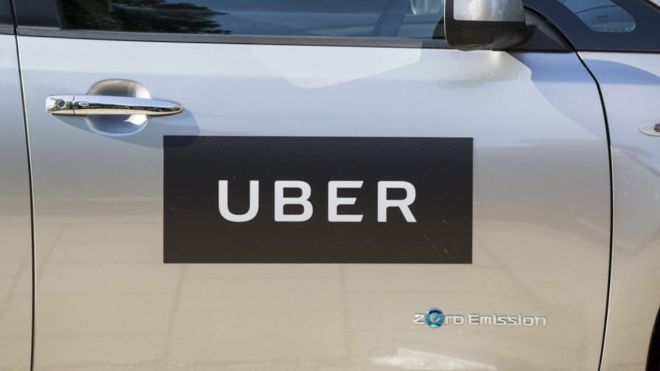 REUTERS
REUTERSUber says it will make changes to avoid being banned in Germany, after a court ruled some of its processes did not respect local law.
In Germany, the app connects passengers to private hire vehicle and taxi firms, rather than independent drivers.
But trade body Taxi Deutschland complained that some of Uber's processes broke Germany's rules on passenger transport.
Uber said it would continue to operate in Germany while it made changes.
What was the issue?
In most countries where Uber operates, the company connects passengers with independent drivers who have signed up to offer rides in their cars.
In the UK and in some other countries, the drivers must be insured and - in some cases - require a license to offer rides to the public.
The company used to offer a service in Germany called UberPop, which connected riders with unlicensed drivers.
However, a German court banned it in 2015 following a complaint from Taxi Deutschland.
Since then, Uber has worked with licensed private hire vehicle companies in Germany, so passengers using the app get picked up by a driver from a traditional private hire firm.
But Taxi Deutschland said some of Uber's practices violated the country's Passenger Transportation Act, which became law in the 1980s.
What was Uber accused of doing wrong?
German law says private hire drivers must return back to their company's base after completing a trip, if they do not have another journey lined up.
Drivers are not allowed to drive around or park somewhere waiting for a new job to come in.
The complaint said Uber had not done enough to make sure the private hire companies it worked with respected this rule.
The law also says that private hire jobs must be accepted by the business, rather than the individual driver.
So, when somebody uses the Uber app in Germany, the company finds nearby drivers and then has to send the booking request to the driver's despatch office.
The job must then be accepted and sent to the driver by a human despatch operator. The process cannot be automated.
The complaint said Uber had also failed to enforce this rule.
How has Uber responded?
In a statement, the company said: "We will assess the court's ruling and determine next steps to ensure our service in Germany continues.
"Working with licensed private hire vehicle operators and their professional drivers, we are committed to being a true partner to German cities for the long term."
The company is deciding whether to appeal against the court's finding.
It can continue to operate for now, but Taxi Deutschland said it would seek enforcement of the court's decision, which would see the company fined if it continued to offer rides.
Uber has faced increase scrutiny over its business practices.
In 2017, Europe's top court ruled that Uber was a transport company rather than just an "information society service", because the company decided the fares passengers were charged.
In November, London's transport authority TFL said it would not extend Uber's licence to operate in the capital.
London Mayor Sadiq Khan said there had been 14,000 fraudulent trips in London in late 2018 and early 2019, and that "safety is the paramount concern".
The company continues to operate as it appeals against the decision.

